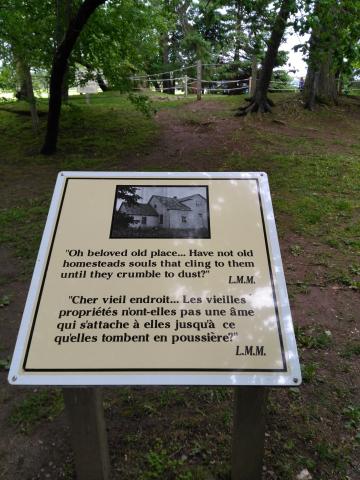In the call for papers for LMMI’s Re-vision Conference, released on 30 November, it was noted: “The conference is being planned as an in-person event in Charlottetown, Prince Edward Island, Canada, 22–26 June 2022, but virtual presentation will be possible in some circumstances. Should travel still be restricted as it currently is, an online or hybrid conference will be held. Updates will be provided as available.” The Vision Forum has served, and will continue to serve over the next couple of months, to honour the thought, research, and preparation that those planning on participating in the conference had already put into the abstracts they submitted. The videos, written pieces, and other material we published in June and will be publishing throughout December and into the new year on the Forum have found a surrogate virtual home. But they also highlight the significance of our mantra, “Come to the Island.”
For the hundreds of people who have attended the LMMI international biennial conference over the years, there are three main reasons they will continue to travel to PEI once restrictions are lifted.
First is access to archival material and special collections relating to Montgomery and the Island at Charlottetown’s Confederation Centre and UPEI’s Robertson Library. Carolyn Collins’s video presentation on the manuscript of Anne of Green Gables, a December Forum posting, is just one of many examples of how central archival research is to Montgomery studies. (See next week’s Forum Monday about Collins’s recently published Anne of Green Gables: The Original Manuscript [Nimbus Publishing, 2019].)
Second is the opportunity to visit Montgomery-related sites, whether the birthplace, village where she was raised, schools she attended and where she taught, places she visited … the list goes on, or those that shaped Anne Shirley, Sara Stanley, Rilla Blythe, Emily Byrd Starr, Pat Gardiner, and the rest of Montgomery’s Island characters. Rebecca Thompson’s recently posted video on “Windows as the Eyes of the Soul in Montgomery’s Fiction” begins by noting the prevalence of windows in both the novels and journals and their role as “threshold spaces connecting the domestic interior with nature.” The textual examples and Thompson’s photographs invoke the PEI landscapes that many yearn to experience for themselves. In the meantime, we can imagine future visits through the interactive map created by Heidi Haering and the virtual tour developed by Carolyn Collins.
Montgomery readers and scholars span the globe, sometimes making travel challenging beyond the restrictions that are a consequence of COVID-19. Travel challenges have, however, rarely prevented those from outside Canada continuing their research on Montgomery. Indeed, in the conference program as originally developed, thirteen countries are represented: Canada, USA, Ireland, UK, Japan, Sweden, Finland, Norway, Germany, Austria, Slovakia, Poland, and South Africa. Meriel Dhanowa, studying at Cambridge last year and now at University of Glasgow, was one who planned on travelling to Charlottetown to present her paper. Instead, she submitted a written piece for the Forum: “Animating Anne: How Akage No An Recreates L.M. Montgomery’s Vision through a Visual Medium.” This essay explores why Anne has been such “a beloved character in Japan” and how this influenced Hanako Muraoka’s translation and Isao Takahata’s adaptation to remain faithful to the original. Next week’s Forum Monday will feature two recent publications that also demonstrate Montgomery’s global appeal: a Finnish spin-off of the Emily series and a Japanese translation of The Alpine Path.
The virtual conferences in which many of us have been participating over the last eight to nine months have provided opportunities to experience events that for personal, professional, or geographical reasons we may have otherwise missed had they been solely onsite. Nevertheless, as the ubiquitous Zoom fatigue continues to take its toll—multiple articles were being written about this as early as last spring, including one in April in National Geographic on how and why “Zoom fatigue” is “taxing the brain”—the passion for travel—the opportunity to visit new worlds, renew old friendships, and make new friends—will never be extinguished. This is the third reason to “Come to the Island”: few academic conferences are developed that reflect the place and congeniality of where they are being held. The L.M. Montgomery Institute’s international biennial conference is an exception.
“Come to the Island” and experience what Elizabeth Epperly describes in explaining why she and Jennie Macneill chose Montgomery’s poem “The Gable Window” as an ideal “bookmark” to represent PEI for Project Bookmark Canada and the Macneill Homestead in Cavendish as the site for the placement of the Bookmark plaque.
“And right there is where the Montgomery fan experiences that ‘I know this place’ feeling and a sense of awe.”
—Elizabeth Epperly

Next Week: Just in Time for Christmas: New Montgomery-Related Books
Reminder: We are accepting content for the Forum until 31 December 2020.
Banner image of PEI waves. Anne Victoria Photography, 2018.